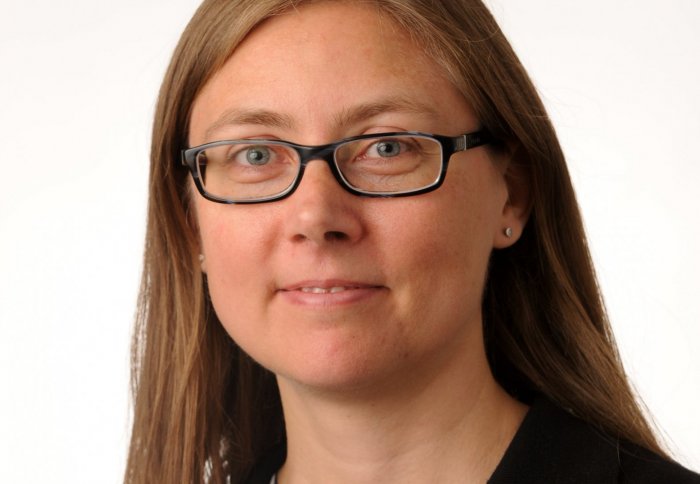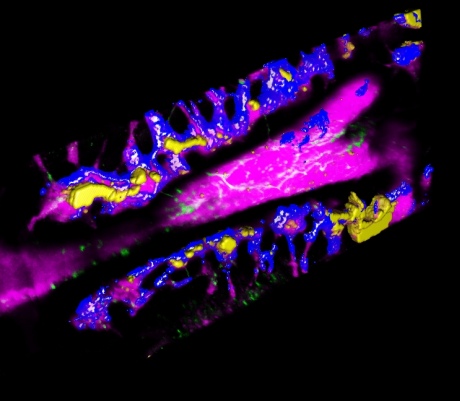Imperial stem cell and leukaemia expert wins prestigious medal

Dr Cristina Lo Celso has been announced as the winner of the Foulkes Foundation Medal 2017, awarded by the Academy of Medical Sciences.
The Foulkes Medal is awarded every two years to a rising star within UK biomedical research for contributing important and significant impacts to the field before, or in, their first independent position.
Cristina’s work epitomises the modern interdisciplinary approach to research that Imperial champions. It’s great to see such work being recognised with this prestigious award.
– Professor Nick Jennings
Vice-Provost (Research and Enterprise)
This year’s winner, Dr Lo Celso from the Department of Life Sciences at Imperial, uses advanced microscopy to study how leukaemia (cancer of the blood), develops, relapses and impairs healthy blood production.
Leukaemia affects adults and children and has one of the highest cancer mortality rates, partially due to its high rate of recurrence. Dr Lo Celso’s research hopes to provide better treatments for sufferers of this devastating disease, with her developments in mice set to be translated for clinical use.
On being awarded the medal, Dr Lo Celso said: “Receiving this prestigious medal is a real honour. For my research to be recognised by the Academy of Medical Sciences and the Foulkes Foundation is incredibly inspiring, and will only increase my determination to work towards improving therapies and learn how to prevent disease.”
Integrative and shared global science
In its citation, the Foulkes Foundation notes that Dr Lo Celso’s prolific career has stretched across several disciplines and countries, taking her from Italy to England via the USA. By working internationally and setting up an interdisciplinary laboratory, she has set out a clear example of integrative and shared global science, both of which are key passions of hers.
Professor Nick Jennings, Imperial's Vice-Provost (Research and Enterprise) said: "Cristina’s work epitomises the modern interdisciplinary approach to research that Imperial champions.
"This approach is more important now than ever because we know that no single discipline can tackle the complex challenges that society faces. It’s great to see such work being recognised with this prestigious award."
Life-changing impacts
Dr Lo Celso’s earliest scientific breakthrough was made during her time in the USA, at Harvard University, where she developed pioneering microscopy techniques, allowing scientists to view living blood stem cells inside their natural environment for the first time.
More recently she has made great advances in looking at the way in which leukaemia cells move inside bones, and why the bodies’ bone-making cells disappear during the development of the disease. The aim of this research is to optimise bone marrow transplantation and treatments for leukaemia patients.

Environments in bone marrow (blue, purple and green) as they are invaded by leukaemia cells (yellow)
About her research, Dr Cristina Lo Celso said: “My fascination with stem cell biology is fuelled by the promise of improving human health, the goal being to unlock the secrets of stem cell function and potential. To have taken my work to a few short steps away from clinical use is incredibly rewarding, both personally and professionally.
“Knowing that life-changing impacts for currently suffering patients are within sight is the biggest push for me. I am determined to continue developing techniques that will reduce the relapse rate of leukaemia, with the ultimate goal to eliminate this aggressive disease forever.”
Start of a promising career
Dr Lo Celso will receive the medal, along with a cash prize, at the Academy of Medical Sciences' AGM on 5 December 2017. She will also deliver a lecture on her research and life as a leading biomedical scientist to the Academy’s prestigious Fellowship.
She is a beacon of innovation and will drive forward the way specialists prevent and treat leukaemia.
– Professor Sir Robert Lechler
President of the Academy of Medical Sciences
Mrs Maureen Foulkes-Hajdu, Chairman of the Foulkes Foundation, said: “It could not please me more to present the 2017 Foulkes Foundation Medal to such a revolutionary scientist. Dr Lo Celso has developed impressive techniques within her own field and beyond, made even more remarkable by her early career stage.
“Her achievements will continue to advance stem cell biology and she will doubtless continue to rise in her field, brightening the future for sufferers of leukaemia. I am particularly delighted to welcome the first woman to join our very distinguished cohort of Foulkes Foundation Medal winners over the last ten years.”
Professor Sir Robert Lechler PMedSci, President of the Academy of Medical Sciences, said: “The Foulkes Foundation Medal is awarded to celebrate the significant work of young, innovative biomedical researchers.
“This year's winner, Dr Lo Celso, represents what science needs the most right now: global, cross-discipline and groundbreaking research. She is a beacon of innovation and will drive forward the way specialists prevent and treat leukaemia. I look forward to seeing her career continue to make great waves in her field, reducing the suffering of those with leukaemia.”
The Foulkes Foundation was established in 1972 by Dr Ernest Foulkes CBE HonMD HonFRCP, with the aim of promoting medical research, the training of scientists and the study of medicine. The Foulkes Foundation Medal has been awarded biennially since 2007.
Article supporters
Article text (excluding photos or graphics) © Imperial College London.
Photos and graphics subject to third party copyright used with permission or © Imperial College London.
Reporter
Hayley Dunning
Communications Division